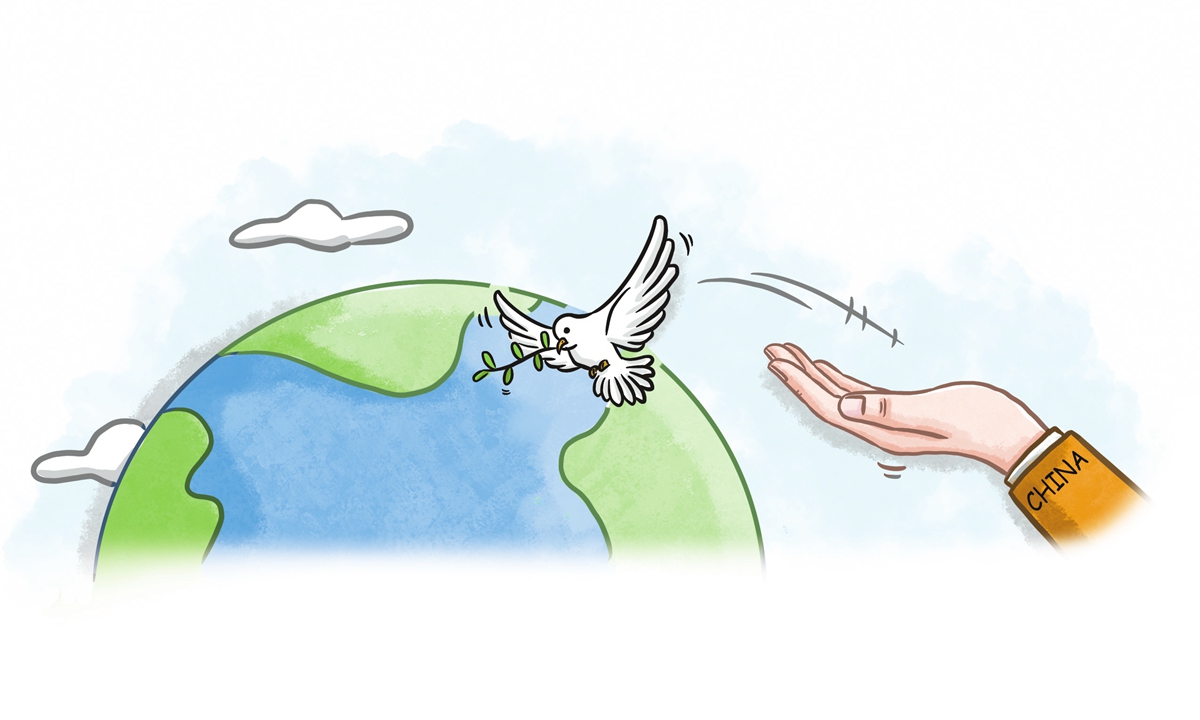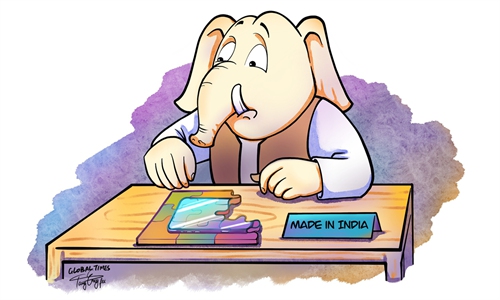Hope some Indian media outlets return to rationality and facts: Global Times editorial

Illustration: Xia Qing/GT
After a sudden escalation in the India-Pakistan situation, a cease-fire has been achieved. While the current cease-fire agreement between both sides is still in effect, some Indian media outlets continue to stir up noise, hyping the so-called Chinese involvement in the India-Pakistan clashes. A recent claim from a self-proclaimed New Delhi-based independent think tank, Center for Joint Warfare Studies, alleged that China had provided Pakistan with air defense and satellite support during the clash earlier this month. Some Indian media outlets have even falsely accused China of shielding "terrorism," while a few have gone so far as to imagine China being part of a so-called anti-India axis. Furthermore, certain Western media outlets have quickly picked up and amplified these narratives, attempting to influence public opinion.
In fact, not long ago, the Indian government officially debunked the fake news circulating in media reports and on social media that "Indian External Affairs Minister Subrahmanyam Jaishankar said Chinese satellites helped Pakistan." The government advised the public to "remain vigilant and avoid falling for deceptive information." Since the outbreak of the India-Pakistan conflict, China has not only repeatedly called on both sides to exercise restraint and avoid escalation, but has also engaged with both countries through multiple channels. China hopes that India and Pakistan will resolve their differences through dialogue and negotiation and return to the path of political resolution.
So far, both the Indian and Pakistani governments have refrained from involving third countries in the conflict, which, to some extent, reflects their shared desire to avoid further complicating the situation. However, Indian media have continued to hype up claims of so-called Chinese involvement - an act that is not only ridiculous but also highly dangerous.
First, China's firm opposition to all forms of terrorism is widely recognized internationally, and accusations that China is "shielding" terrorism are completely groundless. Second, blaming China simply because Pakistan purchases Chinese weapons does not hold water. India itself buys large quantities of weapons from the US, Russia, and France - does that mean these countries are helping India fight Pakistan? To take a step back, if China had really been militarily involved in the India-Pakistan conflict, the situation on the India-Pakistan battlefield would likely not be what it is today. Third, China's approach to neighboring countries is guided by principles of building an amicable, secure and prosperous neighborhood, highlighting the principle of amity, sincerity, mutual benefit and inclusiveness, and pursuing a shared future. The idea of China being part of the "anti-India axis" is pure fantasy, a narrative that Indian media have constructed for dramatic effect.
This conflict is fundamentally an issue between India and Pakistan. As a regional country, China hopes that both sides can resolve their disputes peacefully. The Indian media's hype surrounding China reflects a deeper psychological complexity among some Indians regarding China-Pakistan strategic cooperation and the broader dynamics of China-India relations - including anxiety over the shifting balance of power between China and India. They are unwilling to confront the deep-rooted structural contradictions underlying the complex issues in South Asia, as well as to acknowledge Pakistan's growing defensive and counterattacking capabilities and determination. As a result, fabricating narratives becomes a convenient psychological and rhetorical shortcut - a way to deflect attention and create the illusion of an external enemy. China should not be dragged into a narrative aimed at scapegoating others. This is not only unfair and unacceptable to China, but also extremely dangerous for the region.
As a responsible major power, China has always been a builder of world peace, a contributor to global development, and a defender of the international order. Take the India-Pakistan issue, whether it is promoting the simultaneous inclusion of India and Pakistan within the framework of the Shanghai Cooperation Organization or calling for dialogue to resolve disputes in multilateral forums such as the United Nations, China has been committed to maintaining peace and stability in South Asia. In a previous paper, Hannah Haegeland from the Stimson Center stated that historically, China has played some kind of mediation role in most major India-Pakistan conflicts and dispute. With ample opportunities for conflict, unresolved disputes, there is an upward trend of Chinese stakes in promoting stability.
Since the partition, the Kashmir issue has been the core problem troubling the India-Pakistan relationship. It has not only led to many wars between the two countries but has also posed a significant threat to regional security and stability. The urgent task is to find a way to resolve the Kashmir issue, transforming the current fragile peace into lasting peace, rather than creating new regional tensions.
India and Pakistan are neighbors who cannot move away from each other, and both are also China's neighbors. China has consistently advocated for resolving disputes through dialogue. China is willing to work with India to enhance mutual trust, manage differences, and expand cooperation on the basis of mutual respect and equal consultation. We also advise relevant Indian media and institutions to stop unfounded accusations and sensationalism, and to return to facts and rationality. This is not only beneficial for regional peace and stability but also serves India's long-term interests.



